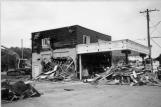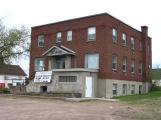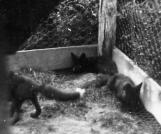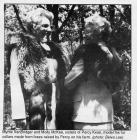42
Around 1962 City Service , later British Petrolium, erected a garage and Service Station at the present site of 31211 Highway 17 in Chalk River. This business did not last long and for a few years the building was empty until in 1976, Mr Carl LaRoche renovated the building , converting it to a restaurant called The Country Kitchen. Mr LaRoche sold to Mr and Mrs Eddy Baker who were operating the business in 1979. During the following 25 years this business changed hands five times however all the dates can not be recalled. It was operated as the Country Kitchen by Bob and Sherry Neilson; as The White Rose, by Tony and Lil Rose from 1989 to 1992; as the Woodquarter by Wolfgang and Carol Staudigl for a time and from 2001 to 2005 by Morris Joyce.44
In 1978 Victor Harper sold the Motel and Service Station to Morris and Lyn Joyce who operated both businesses until 1999 when the Ontario Government bought and demolished both the Service Station and Motel to facilitate Highway expansion..46
Chalk River Tavern takes on new life March 24 1999BY VANCE GUTZMAN
It used to be a second home for some people. Now the former Chalk River Tavern is set to begin a new life as a permanent home for others. Work is on schedule for a grand opening of the revamped structure this Saturday, March 27. The opening ceremony is set to to begin at11:30 a.m
When completed, the historic landmark will boast six spacious apartments geared to low-income earners. There will be four two-bedroom units and two one-bedroom units. The one-bedroom units will also be wheelchair-accessible. Jeff Fern, who is developing the project along with his brother Jason, recently took the NRT for a guided tour of the building. Workers, under the guidance of foreman Lome Ogilvie, were busy putting the finishing touches on the apartments.
The interior of the building is unrecognizable from its past days as a tavern, and getting to this point has not been an easy task, according to Fern. "We've gutted everything," he said. The gutting was necessary because there was no insulation in the building when the Ferns took it over late in 1997.
Despite their dismay at the shape of the building, they decided against demolition and starting construction from scratch. "The basic structure is solid. It would have been a shame to tear it down," he said, noting that the beams and columns were still in good shape. A civil engineer by trade, Fern designed the renovations himself, and some of the changes to the building are designed to keep heating bills from going through the roof. In addition to insulation throughout, the building also has a new membrane roof which expands and contracts to compensate for extreme climate changes. Fern has also taken advantage of the recent introduction of natural gas to the village by installing central gas heat, which can be control led individually in each of the apartments. The new heater is the size of a large box, and replaces the boiler, the size of a small car, which had previously heated the building. Once the snow melts, he'll concentrate on sprucing up outside with some landscaping work. The new residential complex will be known as the "Railway Suites."
48
Audio Text: Reuben Law.Q - Were those all your trucks?
A - Yes
Q - How many did you have?
A - I had ten at one time, I could almost name all the drivers, that there is Spike Leach, that's Stewart I think , my brother Stewart. The fellow over here that drove the float, his name is Bennie Leclerc.
50
Audio Text ; Reuben Law.Q - Are those Hydro Poles you are hauling?
A - Yes, I hauled them from "Racehorse", and dumped them down at the landing at Petawawa, along the railway tracks,. Shaws peeled them there .
52
NRT July 6 1988by Belva Lee
This area is rich and diverse in both its people and how they made a living. Percy Kean of Chalk River, now 79, remember when he, his dad Fred and Ken Kellett decided to get into the fur market by raising foxes.
In 1924 Kean's dad and Kellet bought three pairs of silver-black foxes from Kellett's brother in Bobcaygeon, who guaranteed them eight pups the following spring. The farm at Bobcaygeon would keep the foxes until Kean and Kellett built their fox pens.
Building pens to hold the foxes safe and secure was hard work. Each pair of foxes had a deluxe apartment, one large pen for the female and a smaller attached pen for the male. A third huge pen was then attached to the female's pen for the pups which they would have. The pens were wood framed and enclosed on all six sides by chicken wire. There was a guard fence around all the pens to protect the foxes from predators.
The first foxes arrived in the fall of 1925. The original three pair had had their pups and the total number of foxes was fourteen. As his part of the partnership, Kean's dad fed the foxes. He was also a farmer and the feeding took up a lot of his time. By the end of the two years he decided that it he was going to spend so much time feeding foxes he may as well own them himself, and he bought Kellett's share of the partnership. Kean and his dad then agreed that Kean would take over thetime consuming job of feeding the foxes.
During the summer two of Kean's sisters, Molly and Myrtle, helped him by washing the feeding dishes and watering the foxes. They remembered the foxes were very shy and nervous whenever anyone was around the pens. The foxes were always considered special and no one tried to tame them. Kean said there were two males who would come at feeding time and take food from his hand, but they would run away if he made the slightest quick movement. Kean remembers that the foxes were "very particular", the minute a person did something different than the foxes knew".
When a vixen had her kits she didn't allow them to be seen until they were weaned. Kean knew which fox had more pups because of the amount of food she ate. When the kits were older, the mother foxes would keep them hidden until he had finished the rounds and gone, then they would let the kits come out. If Kean went back to the pens, the mothers would start yapping and the kits would dive for cover. The foxes also got upset if he did anything unusual, such as changing his feeding route or being late.
In 1929 they sold their first fur, about 30, and got $120 for each fur. Kean said that was a high price, the average price was about $30 most years. The first furs were sold locally, but later all furs were sent to the fox breeders association in Price Edward Island, where they brought a better price.
In the early 1930's Kean travelled to the other fox farms in Cobden, Killaloe, Eganville, Pakenham and Alliston. He thought he could do better than he had been doing and wanted to increase the litter size. He talked to the owners, learning how they fed and cared for the foxes, and applied what he had learned to his own foxes. He made an agreement with his dad that he would produce a minimum number of foxes each year. They shared the profit from the next five foxes and he got all the profit from anything above that. As a result of his persistence in learning all he could about the care of foxes and his hard work, one year there were 104 pups and he made $300 more than his dad.
Kean told about the time he went out one morning to feed the foxes and saw footprints around the pens. He found a hammer outside the pens. Two of the foxes had been killed and stolen. In those days there was a local train running from Ottawa to North Bay stopping in Chalk River. Kean drove with his dad to the train station in his cutter. The only way to report the theft was to go to the game warden in Pembroke. When the train arrived from Pembroke the game warden was already on it. He was headed to North Bay where two men with some foxes had aroused suspicion and had been arrested. The men said they had trapped the foxes but the furs were silver-black, not red. Kean's dad went to North Bay with the warden and identified his foxes, which landed the men in jail. The thieves were ordered to pay damages which amounted to quite a lot since the stolen foxes were male and their mates would have no pups that year.
The fox farm provided a living into the 1940's. Then in 1942 prices began to decline. Within a few years the entire market for fox furs was gone. Kean had gradually been reducing the number of foxes he owned, so that in 1945 when several of the furs he had sent to PEI were sold for $3 each, he only had six foxes left. He went out to the foxes, said good bye to them and opened the doors.






